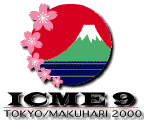
In recent years, as college and university mathematicians have become increasingly engaged in issues of education, ICMI has recognized this emerging interest by offering several forums for analysis of university issues. A 1998 ICMI-sponsored Study Wor kshop on mathematics education in universities formed the foundation for the working group WGA5 at ICME-9. Discussions in WGA5 revealed a variety of serious issues facing university mathematics education, including widely reported declines in the number of students choosing to specialize in mathematics; demands for strengthening the preparation of K-12 teachers of mathematics; and challenges posed by new clienteles of non-specialist students.
The working group heard seven papers in Plenary Session (including a report on the 1998 ICMI Study Workshop) and sixteen short presentations in three subgroups arranged on the themes of Applied and Advanced Mathematics; Preparing Teachers of Mathematics; and Teaching and Learning Mathematics. These papers, and names of the organizing committee, are listed at the end of this report; abstracts of the papers can be found at the links listed above.
Three major themes emerged from these papers and the ensuing discussion:
Participants in WGA5 reported increasing strains on university mathematics education from many different sources. Governments have become increasingly assertive in setting priorities for universities, priorities that often favor basic and practical co urses over the traditional core mathematics curriculum. Students too are different–fewer mathematics specialists, more non-specialists seeking mathematics as a service (rather than a major) course. Individuals from different countries reported that students now arrive at university with weaker skills, or at least with different skills: less fluency with algebra but more experience with technology, less maturity in traditional mathematics, but more familiarity with group projects.
Changing patterns of employment mean that many older students are returning to study college-level mathematics, either to complete an unfinished degree or to develop proficiency needed for career advancement. They, as well as traditional students, are increasingly interested not just in mathematics for its own sake but in mathematics as a tool for understanding the world. Thus mathematical modeling and joint programs such as computational science, financial mathematics, and bioinformatics are becomin g increasingly popular, thereby adding to the pressures bearing down on traditional mathematics programs. Some participants reported that client disciplines are reducing their requirements for mathematics coursework in favor of teaching mathematics as em bedded aspects of their own disciplines.
One participant summarized these changes as a "collapse of privilege" for traditional university mathematics. Increasingly, departments find that they now must defend their position and resources in an increasingly competitive marketplace of ideas.
The engine driving response to these pressures in college and university mathematics departments is a new (in some institutions, unprecedented) thoughtfulness about teaching. This focus is motivated in part by the loss of unquestioned status, but even more by the pedagogical challenges posed by students with non-traditional preparation and goals who are now studying mathematics. University faculty everywhere are exploring new approaches to pedagogy and debating the relative merits of different strat egies. Many have become engaged in the "scholarship of teaching," a systematic reflection on their own pedagogy in the context of broader studies in educational research.
This concern for teaching reaches broadly into all aspects of mathematicians' professional lives. Increasingly, mathematicians are becoming engaged in the preparation of K-12 teachers of mathematics, especially in finding innovative means of linking st udents' mathematical studies with their pre-service teaching experiences in order to develop profound understanding of elementary mathematics. Mathematicians are introducing programs to help graduate students become effective teaching assistants and to h elp them balance their responsibilities as students, researchers, and teachers. These efforts have led one major university to make teaching a part of the research thesis by requiring that the results of the thesis be taught to others.
In many departments of mathematics the responsibilities of a professor now include, in addition to mathematical competence, an additional area of expertise–perhaps technology, perhaps pedagogy, perhaps an important contemporary field of applicatio n. These complementary skills also help mathematicians become teachers in a broader arena, as they now, more urgently than ever before, need to teach not only their students, but also the broader public–including university administrators and gover nment officials–about the pervasive nature of mathematics in today's society.
Many participants raised issues related to transitions that were disturbing the traditional order of university education. One is the increasingly challenging transition students undergo in shifting gears from a secondary school perspective to the ind ependence and rigor of a university context. The difficulty and importance of this transition suggests to some that a genetic, developmental approach to pedagogy in early years of university may be essential to smooth the transition to formal, deductive mathematics. Another is the transition that faculty need to make as mathematics shifts from its historic manual and mental methods to those that are increasingly technological. A third is the transition that departments need to make as their students s hift from being primarily specialists to predominantly generalists. Departments everywhere struggle with the challenge of maintaining integrity of mathematical programs and at the same time meeting the needs of diverse client departments.
Another transition that departments are now beginning to focus on is that which students face as they shift from learning-oriented undergraduate programs to graduate training which encompass balanced responsibilities in learning, teaching, and research . Since most graduate students will become teachers of mathematics, either in secondary or tertiary systems, it is especially important for the future of mathematics that this transition go well.
It is clear from the vigor of discussion that mathematics education in universities is a theme of sustaining importance for ICME. But it is also clear that particular issues may benefit from special attention in the future, separate from general discu ssion. These include: